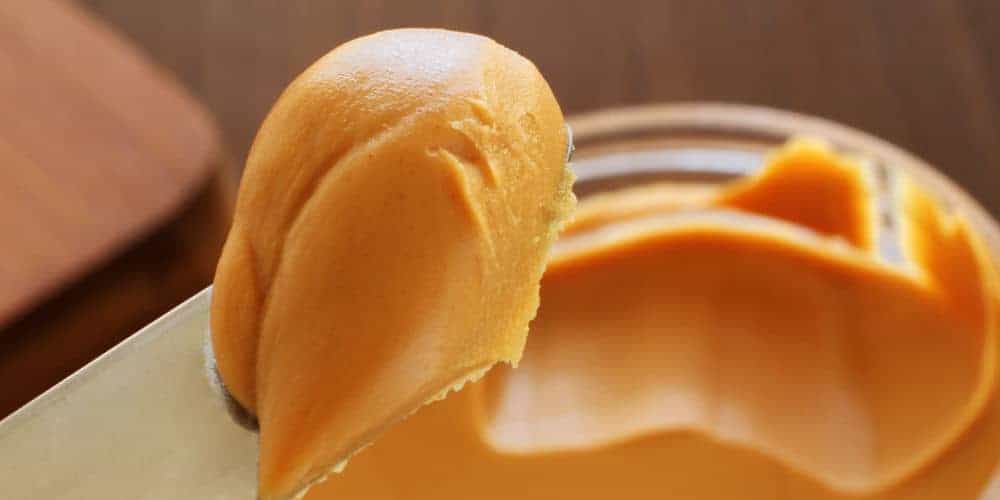Can Cats Eat Peanut Butter?

Peanut butter is a healthy and delicious snack because it’s packed with essential nutrients. It contains resveratrol, which is a potent antioxidant that lowers the risk of cancer. It’s also rich in good fatty acids, Vitamin E, Copper, and Magnesium. But is it a suitable snack for your feline?
Cats are carnivores, and this means that their diet should be mainly made of meat. Their primary diet should be made of high-quality cat food that has been specifically designed to address their nutritional needs. Is peanut butter poisonous to cats? The answer is no, but it is not the best food choice for your cat.
Cat Attitudes is reader-supported. When you buy through links on our site, we may earn an affiliate commission.
So, can cats eat peanut butter? Keep on reading to find out.
Can Cats Eat Peanut Butter?
The answer to this question is a little bit complicated. Peanut butter isn’t the ideal snack to give to your cat, although it’s a nutritional snack for humans. At the same time, it’s not poisonous to cats. So, although it’s not entirely wrong to give your cat peanut butter, it’s not recommended, and vets advise against it.
Peanut butter is packed with healthy nutrients for humans, but they present no nutritional value to cats. This means that your cat will be eating a snack that can only make him put on weight without gaining any essential vitamins or minerals.
Cat food and cat treats are made differently because they’re designed with the cat’s nutritional needs in mind. The composition of cat food is targeted to address several potential health issues, so it will keep your kitty in perfect health. Peanut butter isn’t an ideal snack for cats for several reasons.
The high-fat content in peanut butter isn’t suitable for cats. Trans-fatty acids in peanut butter make it shelf-stable to be used over an extended period of time. However, too many fatty acids are bad for felines.
Salt is also added to peanut butter, and the high sodium content can make your cat very sick.
Peanut butter is rich in calories as a healthy source of energy for humans. However, if you have an indoor cat that doesn’t move much, these calories can increase the risk of obesity.
The thick consistency of creamy peanut butter can represent a choking hazard for felines. Even if your cat is feeding on chunky peanut butter, the small peanut pieces can also cause choking.
Some cats can be allergic to peanuts, just like humans. If you’re not sure that your cat is 100% not allergic to peanuts, it will be hazardous to give it even the smallest amount of peanut butter. Nut allergies can cause a lot of discomfort with mild symptoms like skin rash and itchiness. In some cases, the symptoms can become too severe, leading to choking, tongue swelling, and life-threatening anaphylaxis.
Because it’s not appropriate for cats’ consumption, peanut butter can lead to uncomfortable symptoms. Gastrointestinal upset is quite common when cats eat food that isn’t suitable for them. The symptoms can include diarrhea, gas, vomiting, and stomach pains that take a while to resolve.
Some types of peanut butter are designed to be sugar-free, where the manufacturers replace sugar with Xylitol. This substance is fatal to animals and should be avoided. If your cat consumes Xylitol, it will experience Xylitol- poisoning.
If your cat suffers from any health condition, consuming peanut butter can actually make things a lot worse.
Although peanut butter is a popular treat for dogs, things can be a little different when it comes to cats. Technically, cats can eat peanut butter with no issues, but it’s not the best snack for them, and its consumption can lead to several health problems.
As long as you’re feeding your cat healthy, high-quality cat food, there will be no reason to give it some peanut butter as a snack. You should focus on buying healthy treats and snacks that have been specifically designed for cats, addressing your cat’s health condition and age.
How Can I Feed My Cat Peanut Butter Safely?
Cats are unique, and what one can’t tolerate might work for another. For this reason, some cat owners find that their cats love and crave peanut butter. If you’re eating peanut butter for breakfast or lunch, you might find that your kitty is actually eager to try some. Here are some things that you need to consider before giving it a spoonful.
Always ask your vet. Some tests should be run to assess if your cat is allergic to peanuts. If your cat is allergic, you shouldn’t feed it even the slightest amount of peanut butter to avoid the dangerous side effects.
Treats shouldn’t account for more than 10% of the daily food intake of your feline. If you’re incorporating peanut butter into your cat’s diet, you should make sure that you’re not exceeding this percentage to avoid providing your cat with too many calories which can increase the risk of weight gain and obesity.
Keep an eye on your cat if you’re giving it peanut butter. Although it can be safe for some cats, you should watch out for any unusual reaction, as your pet might not tolerate it.
What Types of Human Food Can Cats Eat?
Cats can eat humans food, as long as it’s healthy, clean, and doesn’t contain any ingredients that can affect their health. Although your cat’s primary diet should be made of high-quality dry and wet cat food, you can also give your cat a little treat of human food from time to time. Some cats will try to share while you’re eating, but you need to make sure that the food works for them. Here are some types of human food that cats can eat.
Meat is supposed to be the main component of your cat’s diet because it’s rich in proteins that keep the heart healthy. If you’re not buying cat food, you can give your cat some clean cooked beef, chicken, or turkey meat. You shouldn’t feed your cat contaminated or spoiled food that you won’t eat. Lean deli meats can also be given to cats but in tiny amounts due to their high sodium content.
Fish is rich in fatty acids that protect the cat’s eyes and heart. Canned and cooked fish can be suitable for your cat, as long as you’re careful about the sodium content. Raw fish isn’t an ideal snack for your cat because it can cause some gastrointestinal upset, and it might contain some microorganisms that can make your cat sick.
Eggs are a good source of protein and can be eaten by your cat. You should make sure that the eggs are properly cooked or boiled because raw eggs can be bad for your kitty.
Some cats like vegetables, and they represent a good source of fiber that they need for healthy digestion. However, they shouldn’t represent a significant portion of your cat’s diet. Cucumber, steamed broccoli, and asparagus can be well-tolerated by your cat, but you shouldn’t include any onions or garlic in your cat’s meal.
Cheese is high in proteins and can be a tasty snack when given in small amounts. However, if your cat doesn’t feel comfortable consuming dairy products or milk, you should avoid it.
Final Thoughts
Peanut butter is a healthy, nutrient-rich snack for humans, but not for cats. It’s not toxic but doesn’t add any nutritional value to your cat’s diet.
Some cats can be allergic to peanuts, and in this case, you should avoid it altogether. Moreover, the thick consistency of the peanut butter can cause a choking hazard.
It’s recommended to give your cat high-quality dry and wet food because they’re both designed to keep it in great health. If you wish to give it a treat, you should stick to meat, fish, and some kinds of vegetables as long as you’re not adding unnecessary calories to the cat’s diet.
